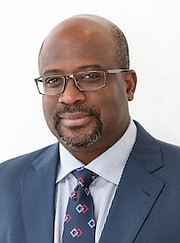By NEIL HARTNELL
Tribune Business Editor
nhartnell@tribunemedia.net
A top insurer says Bahamian underwriters will find it increasingly difficult to survive "long-term" unless they diversify into other territories.
Patrick Ward, Bahamas First's president and chief executive, told Tribune Business in a recent interview that the increasing severity and frequency of hurricane-related losses meant no property and casualty insurer could afford to have their "eggs in one basket".
He pointed to Bahamas First's recent experience with Hurricane Dorian, and its earlier expansion into the Cayman Islands, as evidence of why risk diversification into other territories is becoming critical.
The insurer's recently-released annual report shows that $3.719m in net profits generated by its Cayman-based general and life insurance operations in the 12 months to end-2019 helped to cushion an $8.897m net loss in The Bahamas that was produced by Dorian's record-setting claims.
This reduced Bahamas First's group-wide net loss to some $5.08m, and Mr Ward told this newspaper: "It demonstrates how important it is to have a diversified portfolio.....
"In a year when underwriting results in The Bahamas were significantly negatively impacted by Dorian, Cayman cushioned that and allowed is to have a much better result than if all our eggs were in one basket."
Mr Ward said both territories in which Bahamas First operates are highly unlikely to be struck by the same hurricane, and he added: "It worked out exactly as expected because of the fairly small level of correlation between The Bahamas and Cayman for the same loss to impact both territories.
"We felt it [the Cayman expansion] would be a counterweight like it is today when the results in The Bahamas are not so good and vice versa." Asked how vital geographical risk diversification will be to Bahamian property and casualty insurers going forward, Mr Ward added: "It's extremely important.
"Over time I think it's very difficult for insurance companies in markets like The Bahamas, where you have a high level of frequent catastrophic losses, to trade as a single market operator without having difficulties long-term."
Mr Ward, meanwhile, said Bahamas First had been able to prevent an attempted penetration of its IT system at the height of the COVID-19 lockdown without any sensitive client data being compromised.
"It was one of those phishing e-mails," he revealed, "but fortunately it didn't get beyond that point of coming through as an e-mail and causing some disruption in the e-mail and some of our servers.
"As we said in the annual report, we were able to catch it in time so that it didn't cause complete disruption, and we were able to ensure no sensitive client date was seen or taken."
Bahamas First said in its annual report that it had managed to "prevent the complete shutdown" of its information technology (IT) system when intruders attempted to penetrate it.
It reassured thousands of Bahamian insurance customers that no private financial information or personal details were obtained by the hackers, adding that the episode illustrated how the increasing post-COVID-19 reliance on technology and IT systems will need to be matched by cyber security upgrades.
Noting it had invested heavily in developing its digital platform for delivering products and services in both The Bahamas and the Cayman Islands, Bahamas First told its shareholders: "The issues that have emerged in the aftermath of the COVID-19 spread, and the operational complexities for businesses such as ours, have highlighted the need for this investment.
"Ironically, as we adjust our business practices to accommodate more remote transactions and working capabilities, it has also highlighted the need to heighten our awareness and investment in cyber security."
The insurer added: "We experienced first-hand the unauthorised intrusion into our network by an outside source during the height of the lockdown period in The Bahamas but, fortunately, we were able to prevent the complete shutdown of our business and, just as importantly, protect clients' personal information and sensitive data.
"The world as we know it has fundamentally changed in recent times, but with every challenge comes an opportunity, and we shall do our best to explore the ones within our reach."
Bahamas First Holdings suffered a more than $11.5m year-over-year bottom line reversal for the 12 months to end-December 2019 as Hurricane Dorian turned the prior year's $9.277m profit into a $2.376m total comprehensive loss.
Net losses stood at $5.08m, but a $1.95m gain on the value of its land and buildings, coupled with a $799,433 increase in the value of its securities and other investments holdings, helped to cut the former figure by more t than half tom produce the comprehensive bottom line result.
Bahamas First's annual report revealed that it incurred some 2,250 claims, worth more than $300m in gross settlement payouts, as a result of the Category Five storm's direct strike on Abaco and Grand Bahama. The bulk of these losses will have been picked up by the Bahamian underwriter's international reinsurance partners.





Comments
Use the comment form below to begin a discussion about this content.
Sign in to comment
OpenID